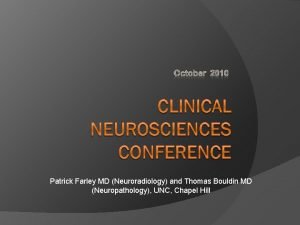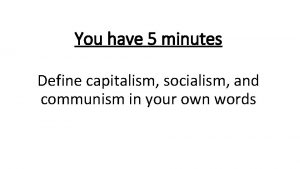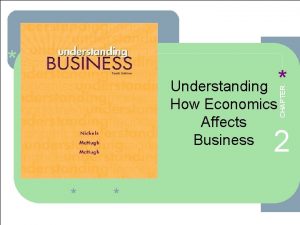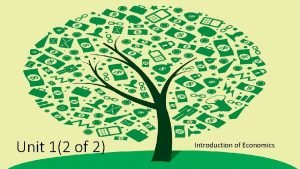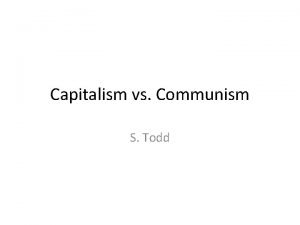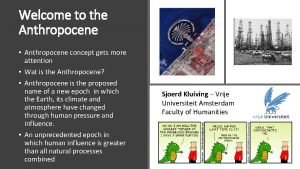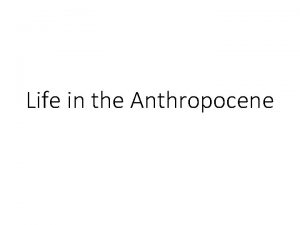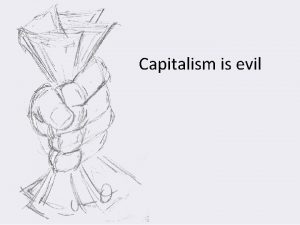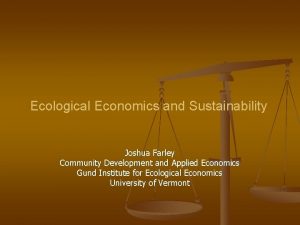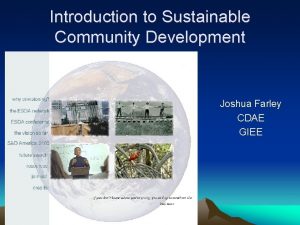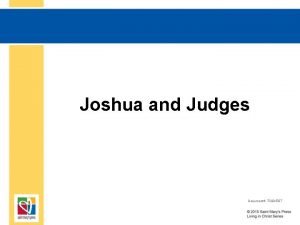Capitalism Cooperation and The Anthropocene Joshua Farley Community













- Slides: 13

Capitalism, Cooperation and The Anthropocene Joshua Farley Community Development and Applied Economics Gund Institute for Ecological Economics University of Vermont

Economies as Evolutionary Systems Hunter gatherer economies (pleistocene) Accumulation = death Agricultural economies (Holocene) Property rights, division of labor, political hierarchy Population density, knowledge, and rate of change

Economies as Evolutionary Systems Industrial economics (Dawn of anthropocene) Fossil fuels, non-renewables Competition Growth Financial economics (anthropocene) Profound change in our lifetimes Price from negative to positive feedback loops Redistribution

Societal Challenges in the Anthropocene Just and sustainable degrowth

Societal Challenges in the Anthropocene Marginal market costs (Market supply curve) Poor people have no demand

Market Solutions Competition, self-interest and choice Preference satisfaction Internalize externalities Make prices reflect full costs Creates incentives for innovation and substitution Preferences weighted by purchasing power Americans spend 6% of income on food for home consumption; ~1% on raw food Many Africans spend 75%; ~ 50% on raw food What happens when prices double? Prioritize preferences or physiological need?

‘Externalities’ and the Anthropocene

Prisoner’s Dilemmas Global Climate Change Natural resource depletion/biodiversity loss (finite raw material sources, finite services) Innovation in the information age Cooperation is best solution

Can People Cooperate? Stupid question Are people good or evil? Characteristics of an evil person Characteristics of a good person Economics, money and cooperation Bauman Y, Rose E. Selection or indoctrination: Why do economics students donate less than the rest? Journal of Economic Behavior & Organization. 2011; 79(3): 318 -327. ; Frank RH, Gilovich T, Regan DT. Does Studying Economics Inhibit Cooperation? Journal of Economic Perspectives. 1993; 7(2): 159 -171. ; Kirchgässner G. (Why) are economists different? European Journal of Political Economy. 2005; 21(3): 543 -562; Vohs KD, Mead NL, Goode MR. The Psychological Consequences of Money. Science. 2006 November 17, 2006; 314(5802): 1154 -1156.

Evolution of Cooperation Genetic Multi-level selection Distribution of pro-social behavior Bacteria, slime-molds, insects, fish, humans (super cooperators) Oxytocin Detecting cheaters Cultural Altruistic punishment Punishing non-punishers Group identity

Economics of Cooperation Peak oil, food supply and pandemics Values maximized at price of zero Competitive markets create scarcity (production and consumption) “Energy transitions produce cultural transitions ” Myxococcus xanthus, Dictyostelium discoideum and the human predicament “Struggle for energy causes violent conflict” Cooperation for energy ends violent conflict

Institutions for Cooperation Institutions can make generous people act selfishly, or selfish people act generously Reciprocity or payments? Social norms: glorify greed or punish it?

Conclusions Markets emerged simultaneously with fossil fuels Nature of ‘scarce’ resources has changed from rival, excludable to non-rival and/or non-excludable Cannot transform physical characteristics of resources to fit market model Must transform economic system to resource characteristics, human behavior Prisoner’s dilemmas Physiological necessities Cooperation and common ownership
 Anthropocene crutzen
Anthropocene crutzen Shannon hoon and chris farley
Shannon hoon and chris farley Shannon hoon chris farley
Shannon hoon chris farley Josh farley
Josh farley Jim farley 1898
Jim farley 1898 Atypia
Atypia Watson farley williams training contract
Watson farley williams training contract Agriculture cooperation and farmers welfare
Agriculture cooperation and farmers welfare Communism and capitalism dbq answer key
Communism and capitalism dbq answer key Pros and cons of capitalism
Pros and cons of capitalism Capitalism pros and cons
Capitalism pros and cons An inspector calls character
An inspector calls character Pros and cons of capitalism
Pros and cons of capitalism Capitalism versus communism
Capitalism versus communism





